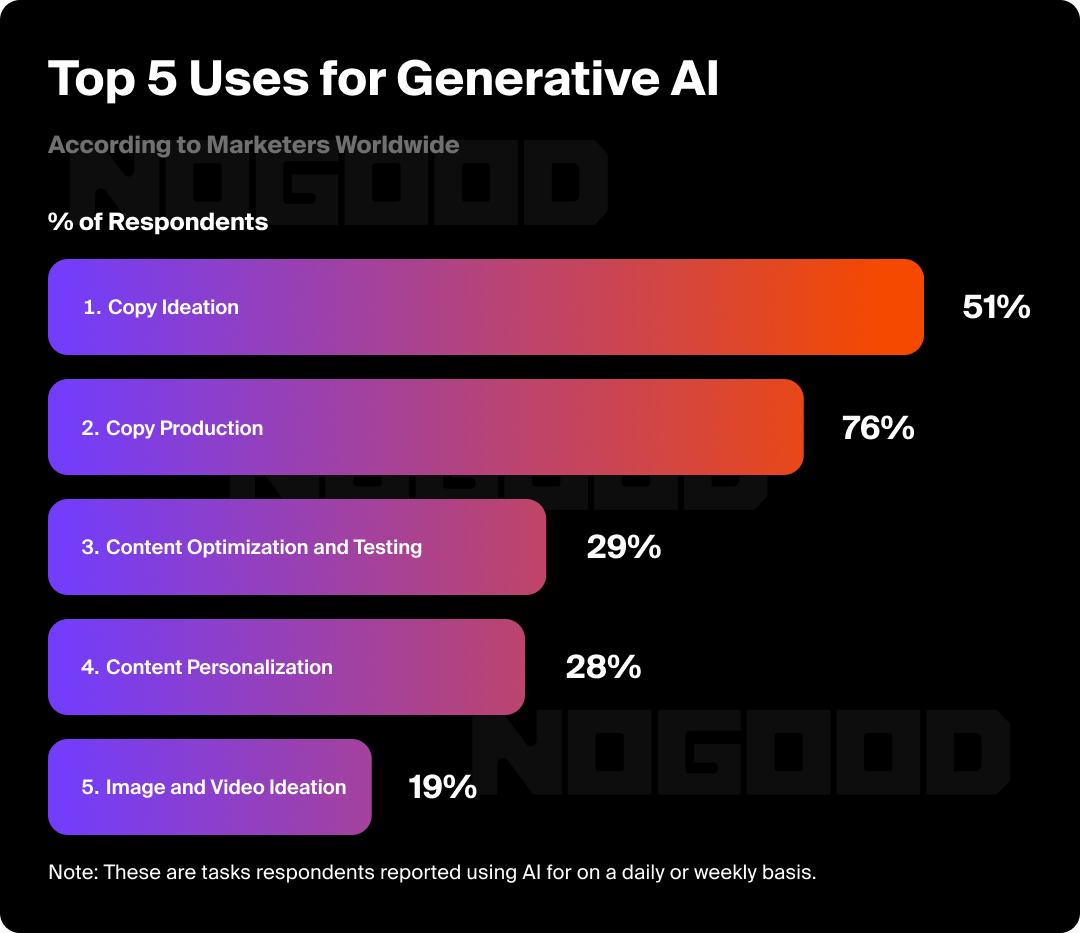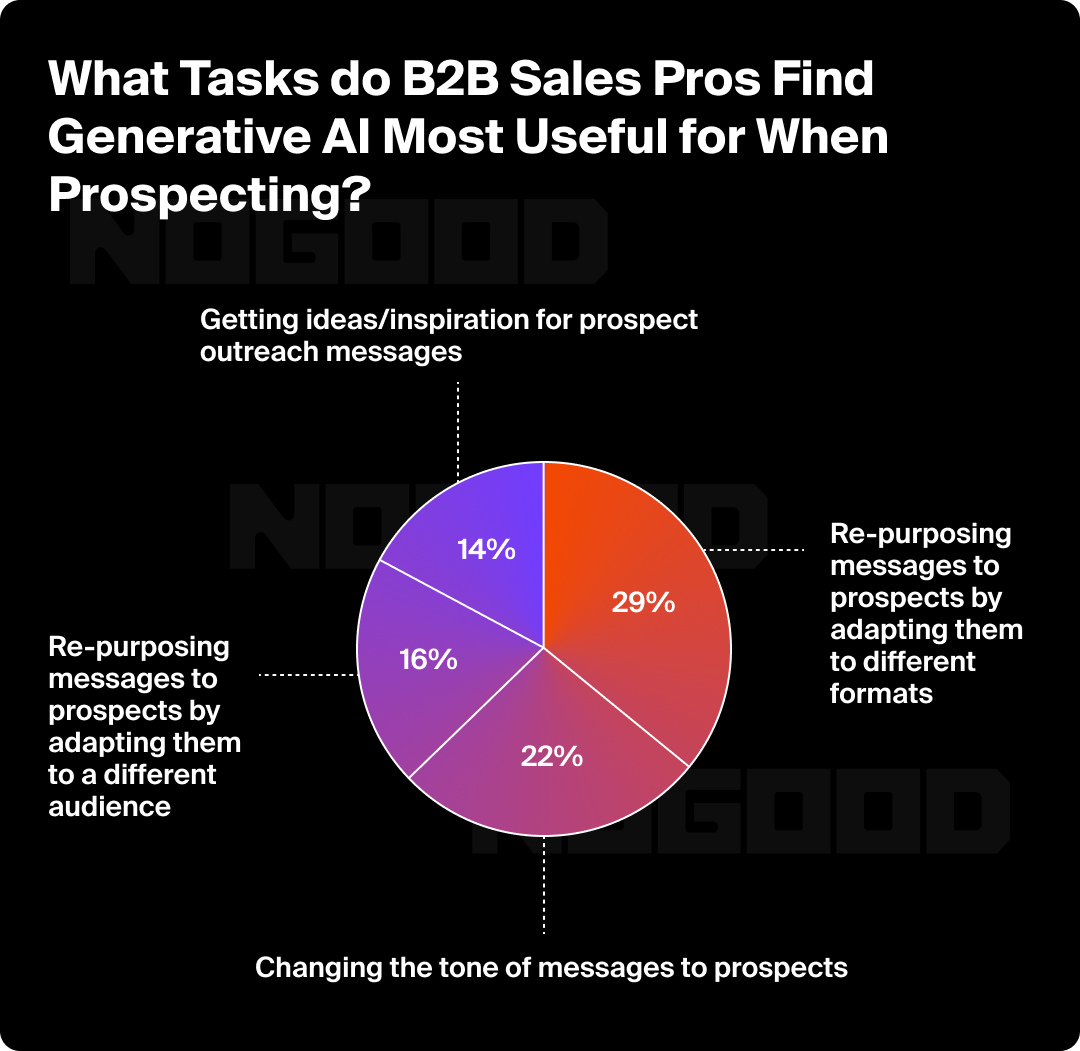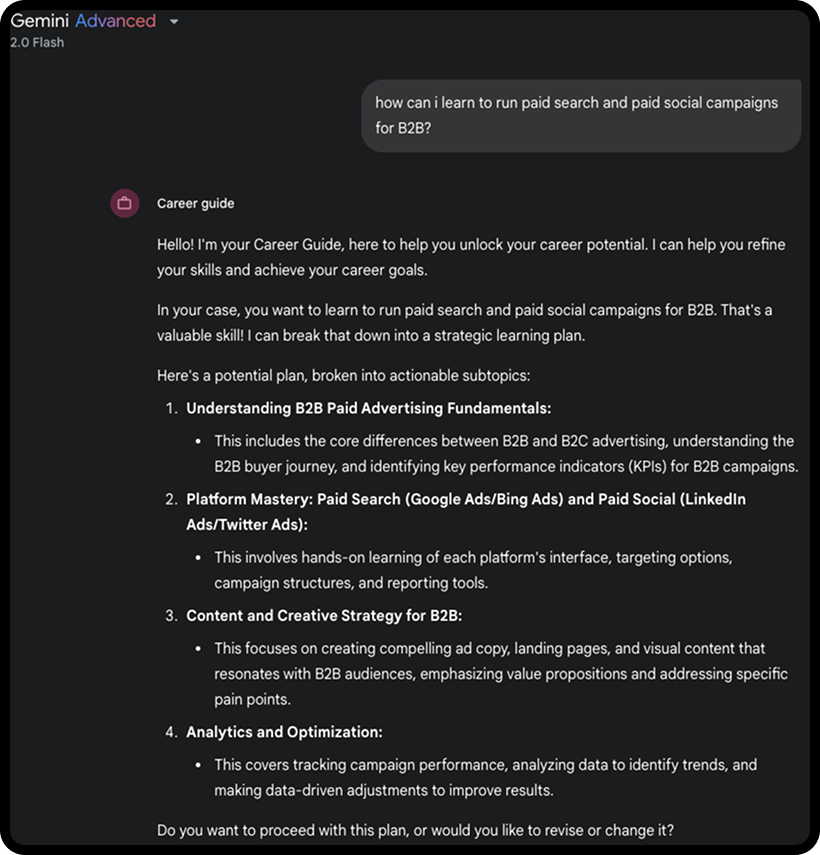Raise your hand if you constantly hear about generative AI everywhere and from everyone. If you’re a B2B marketer reading this right now, you definitely raised your hand, and for good reason. AI, i.e., Artificial Intelligence, and its increasing impact on the world continue to dominate the media landscape, both online and on traditional channels.
As with any new technological leap, the injection of AI into your life brings with it numerous questions.You’ve likely asked yourself: “How should I use Artificial Intelligence?” “Does Artificial Intelligence work for B2B marketing?” “Does Artificial Intelligence actually provide valuable insights?” “Will Artificial Intelligence make my life as a marketer easier?” “Will AI replace B2B sales?”
Well, not to worry, because you’re about to get the ultimate guide to leveraging AI in B2B marketing. You’ll learn how to use AI, what role AI can have in the B2B marketing sales funnel, and how AI affects B2B marketing campaigns and processes.

In an attempt to not put the cart before the horse, let’s first define AI. Artificial Intelligence refers to the development of computer systems that can perform repetitive tasks that typically require human intelligence. Think recognizing patterns, learning from data, providing data-driven insights, and making decisions. AI plays a critical role in automating processes, optimizing marketing campaigns, and delivering personalized experiences to target audiences.
How Is AI Used in B2B Marketing?
When you’re talking about B2B marketing, the goal is sales. But how do you get to sales? How do you get the big fish? Traditional B2B marketing suggests you use account-based marketing, lead generation, and personalization. Thanks to AI, a world beyond traditional B2B marketing strategies now exists, so much so that 96% of executives say generative AI is a hot topic of discussion with their boards.
Let’s walk through some B2B marketing AI use cases.
Using AI for B2B Marketing Analysis
When it comes to B2B marketing, the goal is to create segmentation and personalization throughout your paid media strategies, CRM strategies, content marketing, and sales tactics. Understanding your audience remains the key to closing big deals, even as the tech landscape rapidly evolves. Prior to AI, a B2B SaaS company required a team of people who crunched numbers all day to provide data analysis. Now, AI can do all of the hard work on a consistent basis.
Imagine you want to understand what time of day a person with a specific job title clicks on your ad, visits the landing page, and hits “request a demo.” Now, instead of relying on dashboards built into Salesforce to provide you with actionable insights, you can automate the entire process. No more surveys and customer interviews. With task automation, you can get the high-quality data you need to plan out marketing strategies that will actually work.
This means less money spent on ads, higher ROAS, and clients with a longer LTV. AI can unlock necessary B2B marketing data, such as generating cohorts likely to schedule a demo, recognizing online customers more likely to engage, and identifying what times you need the B2B customer to engage to have the highest success rate.
AI Can Drive B2B Content Generation
B2B marketers tend to focus on one thing for brand awareness: content, content, content. Why? Because in B2B, brand awareness means B2B sales. Content is king because it’s in everything you present to your potential customers.

B2B marketers constantly churn out marketing content such as blogs, ebooks, ad copy, etc. That’s how your B2B business gets discovered. Turning to an AI platform such as ChatGPT can significantly help your productivity and can even inspire new ideas. Leverage generative AI tools for B2B marketing to personalize your high-quality content, feed it cohorts to come up with ad copy, or even use it to help write your blogs (just remember to add a human touch – no one wants to read any more AI slop).
AI Tools for B2B Audience Insights and Predictive Analytics
The best AI tools for B2B marketing can analyze vast amounts of data to gain customer insights into buyer behavior, preferences, and demographics. By harnessing these insights, B2B marketers can create highly targeted and personalized content, improving the chances of engagement and conversion.
AI algorithms can predict future trends and behaviors based on historical data. In B2B marketing, predictive analytics help identify potential leads and guide sales teams toward the most promising prospects.
Essentially, this provides data analysis at scale. AI has the capacity to process and analyze vast volumes of data far more quickly and accurately than humans can. This includes data from various sources, such as website interactions, social media engagement, email interactions, and historical sales data. By aggregating and analyzing this data, AI can uncover patterns and trends that might go unnoticed through manual analysis.
What Is the Role of AI in the B2B Sales Funnel?
B2B is all about sales, right? B2B marketing creates a B2B sales funnel. The funnel gets filled with prospects, whether from organic traffic, paid media, or outbound calls. So, how can you leverage AI to fill your sales pipeline with more qualified leads that will hopefully turn into customers?
Use AI to Create Personalized Experiences
The name of the game is prospecting. But how can you ever really know what a prospective buyer wants to see? AI can analyze individual customer preferences and behavior to personalize content recommendations. This goes beyond simply addressing the recipient by name – it involves tailoring the entire content experience to match a customer’s interests and needs. This kind of personalization at scale allows the sales team to deliver content and recommendations to a large audience, fostering stronger connections with potential clients.

Improve B2B Sales Data Analytics with Generative AI
Thanks to predictive analytics, AI can gather deep insights into customer behavior and preferences to help your team make better decisions about how to approach each interaction. Furthermore, the problem of having to clean data to make those decisions – consider it gone.
AI-powered tools can automatically clean and enrich sales data. This includes removing duplicate entries, standardizing data formats, and filling in missing information. Clean and enriched data ensures that sales teams work with accurate and complete information.
AI can also provide your B2B sales team with forecasting models that use historical sales data, market trends, and other relevant factors to predict future sales performance accurately. These forecasts help businesses plan strategy, allocate resources, and set realistic sales targets. You can train an AI platform like ChatGPT to fit your specific needs with effective prompt engineering.
Automate Lead Qualifying and Lead Scoring with AI
What is the likelihood that a prospective lead will actually convert? Even if your manual scoring system says 90%, you never really know. Therefore, you could be spending time on a prospect that could be a waste.
AI can help when it comes to lead scoring and qualifying promising leads. How? AI algorithms can automatically score and prioritize high-quality leads based on their likelihood to convert. This ensures that sales teams focus their efforts on leads with the highest potential, increasing efficiency and conversion rates. The role of AI in B2B marketing isn’t to replace B2B sales, it’s to help the sales and marketing teams close leads more efficiently.
To take it one step further, AI can track leads and prospects through the sales funnel, providing insights into where leads get stuck or drop off. This information guides marketing efforts to optimize the sales process and improve conversion rates.
How Does AI Affect B2B Marketing Processes?
The AI landscape changes at an ever-increasing pace. Reinforcement learning and larger-scale leaps, such as the introduction of reasoning models, have pushed AI from helping improve copy reasonably well a few years ago to affecting the job market. Unless legislation changes the trajectory of AI growth, we can expect AI-based tools to impact B2B marketing more and more. So, how can you turn yourself into a “10X” marketer of the future?
AI Makes You More Efficient
As the labor market tightens, marketers with knowledge and experience will remain in demand – should they keep up with the latest AI advancements.
Your overall productivity can skyrocket with an AI assistant by your side. Use AI to improve your knowledge base, up your writing chops (even in a non-native language), generate dozens of content or strategy ideas in seconds rather than an hour, and analyze data in ways you never knew you could.
Say you have new responsibilities at work, such as running paid social and search campaigns for the first time. Ask your favorite answer engine for an educational plan. Gemini, for instance, has a dedicated “Career guide” section.

Steer the answer engine in the right direction and upskill. Then rinse and repeat.
Customize AI to Your Needs
Perhaps your website’s conversion rate has slumped. Aside from utilizing AI to analyze performance and hypothesize on the reason behind the issue, consider customizing a chatbot to answer website visitors’ questions. A chatbot can answer product questions, schedule demos, or even guide potential customers through the majority of the buying process, freeing you up to focus on more strategic initiatives.
AI Helps Scale
Scaling your company takes hard work. Luckily, AI can help you solve this problem. AI can take the time that it would cost a team to complete a task and cut it down dramatically. Your AI software can consume far more information than a single human or marketing team. It can analyze thousands of leads at a time, create endless personalized messages, and predict trends you need to get ahead of.
Utilize AI for Continuous B2B Optimization
Artificial Intelligence is just that: computer learning. Algorithms constantly evolve, learn, and improve. AI can optimize paid media, leaky funnels, drop-off points, and more by consistently getting better at what it does. If you leverage AI, you’ll stay ahead of the curve before you even realize you’re behind it.
Artificial Intelligence has proven its value as more than just a buzzword: it’s a transformative force in the world of B2B marketing. From refining customer insights to automating processes and enhancing the efficiency of sales teams, AI empowers businesses to stay competitive and drive growth.
As AI continues to evolve, it will take on an increasingly significant role in B2B marketing. Embracing this technology and harnessing its capabilities has moved from a nice option to an absolute necessity for businesses looking to thrive in the digital age. So, start exploring the world of AI in B2B marketing today, and prepare to reap the rewards of innovation and progress.






